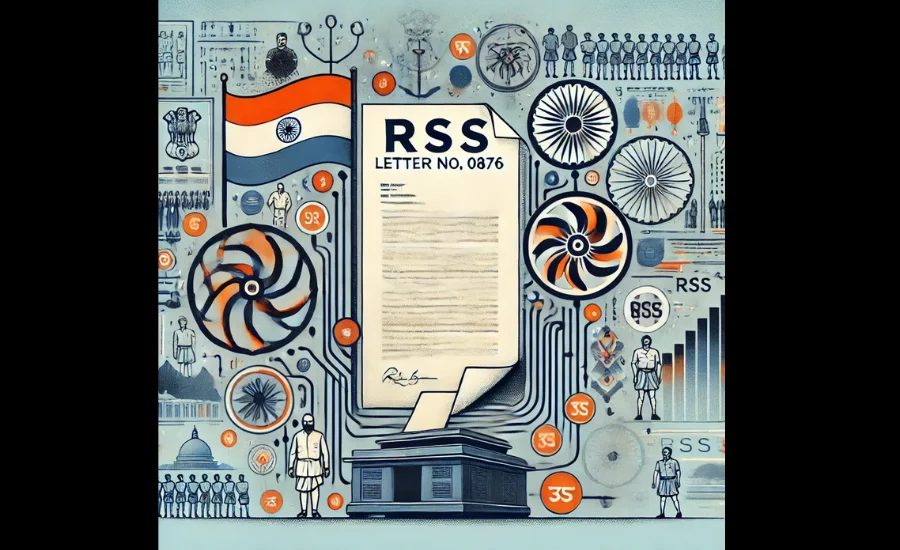The digital landscape is evolving rapidly, with fresh developments continually shaping how we engage with content online. One recent update generating buzz among subscribers and content creators alike is the RSS Letter No 0876. But what exactly does this letter entail, and why should it be on your radar? In this guide, we’ll break down the essentials of RSS Letter No 0876 to help you understand its purpose, its impact on RSS feeds and newsletters, and why it might matter to anyone interested in digital media.
In the sections that follow, you’ll find a detailed overview of this new development, insights into its potential impact on the distribution of digital content, and practical advice on how to adjust to these updates. Whether you’re an active subscriber, a content creator looking to stay ahead, or simply someone with an interest in digital trends, this article will offer the guidance you need to navigate the evolving world of RSS feeds with confidence.
What is RSS Letter No 0876?
RSS Letter No 0876 is a new iteration of the traditional RSS feed format, specially tailored to provide timely and highly relevant content updates to subscribers. While standard RSS feeds simply distribute content as it’s published, this letter goes further by filtering and curating the information, allowing users to receive only the most relevant news. This unique structure makes it an essential tool for professionals and enthusiasts alike, enabling them to stay informed on specific topics without the noise of irrelevant content.
In short, RSS Letter No 0876 redefines the traditional approach to RSS feeds by tailoring information flow and prioritizing content relevancy. This enhanced functionality saves time for subscribers and serves as a reliable source of updates across niche areas, helping users stay competitive and well-informed.
Historical Foundations and Evolving Purpose
RSS Letter No 0876 is likely rooted in the legacy of early 20th-century nationalist movements, which aimed to unite India under a shared cultural and spiritual identity. Drawing inspiration from the teachings of nationalists like Swami Vivekananda, these letters initially served to strengthen moral fortitude and instill a sense of cultural pride. However, RSS letters have evolved over time, responding to the changing landscape of Indian society. Unlike early documents, which were often introspective, RSS Letter No 0876 would likely address contemporary challenges such as digital literacy, environmental sustainability, and economic resilience.
This evolution reflects the RSS’s adaptability, as the organization has broadened its scope to remain relevant in a modern, interconnected world. By adapting traditional values to address modern issues, RSS Letter No 0876 would ensure that the organization’s message resonates with readers across generations, making the document a bridge between India’s historical identity and its present aspirations.
Key Features of RSS Letter No 0876
One of the most compelling aspects of RSS Letter No 0876 is its structured approach to information dissemination. Each edition of the letter begins with crucial details, including publication dates and an outline of the core topics. This structured approach provides a clear and organized introduction to each update, ensuring subscribers know what to expect at a glance.
In addition, RSS Letter No 0876 emphasizes delivering a streamlined content summary. This feature is particularly beneficial for subscribers who wish to quickly assess the relevance of each update before diving in. By prioritizing usability and reader experience, RSS Letter No 0876 positions itself as a valuable resource that respects the reader’s time and enhances content engagement.
Background of the Rashtriya Swayamsevak Sangh (RSS)

The organization behind RSS Letter No 0876, the Rashtriya Swayamsevak Sangh (RSS), has a long history in India. Founded in 1925 by Dr. Keshav Baliram Hedgewar, the RSS is one of India’s oldest and most influential volunteer-driven organizations. Over the years, it has played a key role in shaping the political and social landscape in India through its work in areas such as education, social service, and cultural preservation.
The mission of the RSS extends beyond politics and centers on fostering national unity, promoting self-reliance, and preserving Hindu culture. These foundational principles are evident in RSS Letter No 0876, which continues the organization’s tradition of influencing social and economic development. By understanding the background and values of the RSS, we gain deeper insight into the goals and intentions driving this letter.
The Role of RSS Letter No 0876 in Promoting National Identity
A major focus of RSS Letter No 0876 is to strengthen national pride and cultural identity. The letter advocates for unity and cohesion, encouraging the celebration of India’s diverse heritage. This aligns with the broader mission of the RSS, which aims to promote a shared national identity rooted in Hindu traditions.
The emphasis on cultural preservation is particularly significant in today’s globalized world, where traditional practices and values can often be overlooked. By underscoring the importance of cultural heritage, RSS Letter No 0876 seeks to inspire pride in India’s rich history while fostering a sense of unity and belonging among its readers. This focus on cultural pride not only resonates with individuals but also aligns with larger societal objectives of unity and resilience.
Encouraging Economic Self-Reliance
RSS Letter No 0876 also places a strong emphasis on economic self-sufficiency, aligning with India’s national goals. This initiative supports the government’s “Make in India” campaign, which promotes domestic manufacturing as a way to boost the economy and create job opportunities. By advocating for reduced dependency on imports, the letter reinforces the importance of building a robust local economy that can withstand external challenges.
Self-reliance is a recurring theme in RSS Letter No 0876, reflecting a belief in India’s ability to thrive independently. By promoting local production, the letter emphasizes sustainable economic growth that benefits all citizens. This focus on economic resilience aligns closely with national priorities and highlights the RSS’s commitment to fostering an environment that supports prosperity and opportunity for all.
Influence of RSS Letter No 0876 on National Policy
One of the most impactful aspects of RSS Letter No 0876 is its influence on Indian national policy. The ideas presented in the letter align closely with the policies of the Bharatiya Janata Party (BJP), the RSS’s affiliated political organization. This alignment facilitates the implementation of policies that embody the RSS’s vision, from promoting cultural cohesion to advancing economic self-reliance.
RSS Letter No 0876’s influence on policy extends across sectors such as education, national security, and cultural preservation. The letter’s guidance helps shape legislative agendas, contributing to a governance approach that reflects the values and goals of the RSS. This synergy between the RSS’s objectives and government policies strengthens the organization’s role in shaping India’s future.
Economic Impact of RSS Letter No 0876
The economic themes of RSS Letter No 0876 resonate closely with India’s national priorities. By promoting self-reliance and supporting local production, the letter reinforces the goals of initiatives like “Make in India.” This emphasis on domestic manufacturing supports job creation, encourages entrepreneurship, and bolsters India’s economy.
In advocating for self-sufficiency, RSS Letter No 0876 aligns with broader economic strategies that prioritize resilience and sustainable growth. This approach highlights the RSS’s role in shaping economic policy and demonstrates the letter’s influence in steering the country toward a more independent and prosperous future.
Challenges and Criticisms of RSS Letter No 0876
RSS Letter No 0876 has not been without controversy. Some critics argue that its focus on Hindu cultural values may be exclusionary, potentially marginalizing non-Hindu communities. These concerns raise important questions about how national pride can be promoted inclusively.
The letter’s strong emphasis on nationalism has also led to concerns about communal harmony. Critics argue that promoting a single cultural identity could detract from India’s diverse cultural fabric. This ongoing debate underscores the challenges the RSS faces in balancing its objectives with the need for inclusivity and social unity.
Relevance of RSS Letter No 0876 for Businesses and Content Creators
RSS Letter No 0876 holds value for businesses and content creators by highlighting opportunities for involvement in social and economic initiatives. For instance, businesses that align their practices with the letter’s principles of social responsibility and cultural pride can resonate more strongly with audiences. This approach enhances brand loyalty while supporting socially beneficial outcomes.
For content creators, RSS Letter No 0876 serves as a source of inspiration, offering insights into topics related to national pride, economic self-sufficiency, and social welfare. By exploring these themes in their content, creators can engage audiences on meaningful issues that reflect the interests of the Indian public.
Cultural Heritage and National Identity
At the heart of RSS Letter No 0876 would likely be a call to preserve India’s rich cultural heritage, connecting the past with the present. This focus on heritage may begin with an exploration of India’s languages, including ancient languages like Sanskrit, as they serve as key carriers of wisdom, tradition, and knowledge. By promoting these languages, the letter would aim to revive interest in classical Indian literature, reinforcing an understanding of Indian civilization’s intellectual depth. In addition to language, the document would celebrate traditional festivals, arts, and crafts, framing them as touchstones of national pride and identity.
Further, the letter might explore the importance of Indian philosophy, invoking figures such as Swami Vivekananda or Adi Shankaracharya, who emphasized India’s role in spiritual and moral leadership. Readers would be encouraged to view these teachings not merely as abstract ideals but as actionable principles guiding their daily lives. By revisiting these philosophical foundations, the RSS Letter No 0876 would seek to foster a spirit of self-discipline, empathy, and ethical conduct, thereby creating a moral framework for individuals committed to uplifting their society.
Youth Development and Education for Nation-Building

A critical theme in RSS Letter No 0876 would likely be the development of India’s youth, positioning them as the cornerstone of nation-building. Recognizing the significance of education, the letter might outline initiatives designed to foster patriotism, discipline, and responsibility among young Indians. It could encourage educational reforms and extracurricular activities that emphasize character-building alongside academic achievement.
The letter may introduce specific programs aimed at instilling self-confidence and leadership skills among students. These initiatives could include youth camps, mentorship opportunities, and forums where young people could engage in discussions on societal issues. By empowering the youth to take an active role in their communities, RSS Letter No 0876 would envision a generation capable of tackling modern challenges while remaining anchored in traditional values.
Structure and Presentation: A Modular Approach for Clarity and Engagement
To communicate its themes effectively, RSS Letter No 0876 would likely be structured in a modular format. Each section might cover a distinct theme—such as national pride, social responsibility, or self-reliance—allowing readers to focus on areas most relevant to them. This format could open with an anecdote or a quote from a respected Indian thinker, setting a reflective tone and linking the reader to India’s intellectual heritage.
The document’s language would be clear, concise, and action-oriented, emphasizing practical steps rather than theoretical discussions. For instance, rather than simply promoting economic self-reliance, it could encourage readers to support indigenous businesses or engage in local entrepreneurship. By offering concrete actions, the letter would transform ideas into a roadmap for community involvement, allowing individuals to feel their contribution is both necessary and achievable.
Moreover, RSS Letter No 0876 might include real-life case studies, spotlighting local branches or Shakhas that have made a tangible impact in their communities. These examples would serve as inspiration for other volunteers and branches, showing how consistent effort and commitment can lead to significant social change. Testimonials from those positively affected by RSS initiatives would also underscore the importance of these efforts, helping to build a narrative of communal progress.
Community Engagement and the Role of Volunteers
RSS Letter No 0876 would be crafted to resonate with a diverse readership, including young professionals, students, and community leaders. Its message would likely inspire young people to engage in service activities, fostering a sense of responsibility and patriotism. For community leaders and local branch organizers, the letter would provide actionable guidance on organizing events, mobilizing volunteers, and building outreach initiatives.
Beyond the organization’s core members, the letter would seek to reach the broader public, fostering awareness and support for the RSS’s values and mission. By engaging readers who may not yet be directly involved with the RSS, the document aims to expand the circle of individuals committed to social progress and national pride.
Initiatives and Campaigns for Social and Economic Resilience
RSS Letter No 0876 would likely outline specific initiatives designed to tackle issues such as digital literacy, environmental sustainability, and public health. Recognizing the increasing importance of technology, the letter might propose digital literacy campaigns aimed at rural and underserved areas. These efforts could include workshops on computer skills, internet use, and cybersecurity, helping communities adapt to an increasingly digital world.
Environmental conservation would also feature prominently, with the letter encouraging activities like tree-planting, clean-up drives, and the promotion of sustainable practices. By framing environmental stewardship as a patriotic duty, RSS Letter No 0876 would aim to mobilize volunteers to protect and preserve India’s natural resources.
In addition to environmental efforts, the letter could promote health and hygiene awareness, highlighting ongoing public health campaigns. Through medical camps, preventive healthcare initiatives, and support for government missions such as Swachh Bharat (Clean India), the letter would underscore the importance of community health as a foundation for societal well-being.
Responding to Modern Challenges and Globalization
RSS Letter No 0876 would also address the impact of globalization on Indian culture, urging readers to preserve cultural integrity amidst rapid change. By promoting “Swadeshi,” or the use of indigenous goods and services, the letter would encourage economic self-reliance. The document could suggest practical ways to prioritize Indian-made products and foster local production, thus creating economic resilience.
Beyond economic challenges, the letter might examine the cultural implications of globalization. It would encourage readers to embrace their heritage by celebrating Indian art, literature, and history. By fostering a sense of cultural pride, RSS Letter No 0876 would equip individuals to navigate the globalized world without losing their unique identity.
Media Literacy and Effective Communication
In a time of widespread information, RSS Letter No 0876 would emphasize the need for media literacy to combat misinformation and encourage informed citizenship. By promoting critical thinking, the letter would advise readers to approach news sources discerningly, fostering a well-informed public that is resistant to sensationalism and fake news.
For volunteers involved in public outreach, the letter would provide communication strategies, offering guidance on public speaking, digital media use, and community engagement. By empowering volunteers with effective communication tools, the letter would enhance the RSS’s capacity to reach and mobilize diverse communities.
Encouraging Active Participation and Civic Engagement
The letter would conclude with a call to action, inviting readers to join local Shakhas or participate in RSS-led initiatives. By attending these gatherings and engaging in community activities, individuals could deepen their connection with their heritage and contribute to collective growth.
RSS Letter No 0876 would also encourage support for indigenous businesses, offering a list of recommended products and services that readers could integrate into their daily lives. Through such consumer choices, the letter would illustrate how personal actions contribute to the larger goal of economic independence.
Furthermore, the document would outline various social welfare activities, such as educational programs and public health drives, encouraging readers to volunteer their time and skills. By providing details on upcoming events, the letter would facilitate direct engagement, enabling readers to transform inspiration into tangible action.
How to Subscribe to RSS Letter No 0876
Subscribing to RSS Letter No 0876 is easy and can be done via multiple platforms. Interested users can visit the official RSS website, where they can sign up with their email to receive each new edition directly in their inbox. This ensures subscribers stay current with the latest updates and insights.
Additionally, RSS Letter No 0876 is available through various RSS reader applications, such as Feedly and Inoreader. These apps offer a convenient way to access the letter on the go, making it easy for subscribers to stay informed anytime, anywhere.
Overcoming Common Challenges with RSS Feeds

While RSS feeds are a powerful tool for staying updated, they can sometimes present technical challenges. Issues like feed errors or connectivity problems can disrupt the reading experience. To avoid these issues, users should keep their RSS readers updated and address common issues promptly.
Managing content overload is another common challenge with RSS feeds. By focusing on a select number of high-quality sources and utilizing features like filters and tags, subscribers can reduce the risk of information fatigue and stay focused on the most relevant updates.
Future of RSS Letter No 0876 and RSS Technology

The future of RSS Letter No 0876 is promising, with plans for further expansion and feature enhancements. As technology evolves, the letter may incorporate multimedia content, interactive features, and personalization options. These developments will make it even more valuable to subscribers by offering a richer, more immersive experience.
In the broader context, RSS technology is also expected to evolve. Improved functionality and more sophisticated content curation will enable users to stay informed on topics that matter most to them. RSS Letter No 0876 is at the forefront of these changes, leading the way in transforming digital content delivery.
Final Words
In conclusion, RSS Letter No 0876 represents a significant development in the digital content landscape. By offering tailored and relevant updates, it ensures that subscribers and content creators stay informed on essential topics without being overwhelmed by irrelevant information. This curated approach enhances the overall user experience, making it a valuable tool for anyone navigating the world of RSS feeds. Additionally, RSS Letter No 0876’s historical and cultural roots, tied to the mission of the Rashtriya Swayamsevak Sangh (RSS), reflect a broader vision of national unity, self-reliance, and cultural preservation. As this format evolves, its influence on both digital media and national policy will only grow, continuing to shape the way we consume content in the digital age. Subscribing to RSS Letter No 0876 can offer readers timely, insightful updates that are both relevant and impactful, helping them stay ahead in a rapidly changing world.
For the latest insights and updates on the evolving digital landscape, stay connected with Gravity internetnet– your go-to source for all things digital and beyond.




